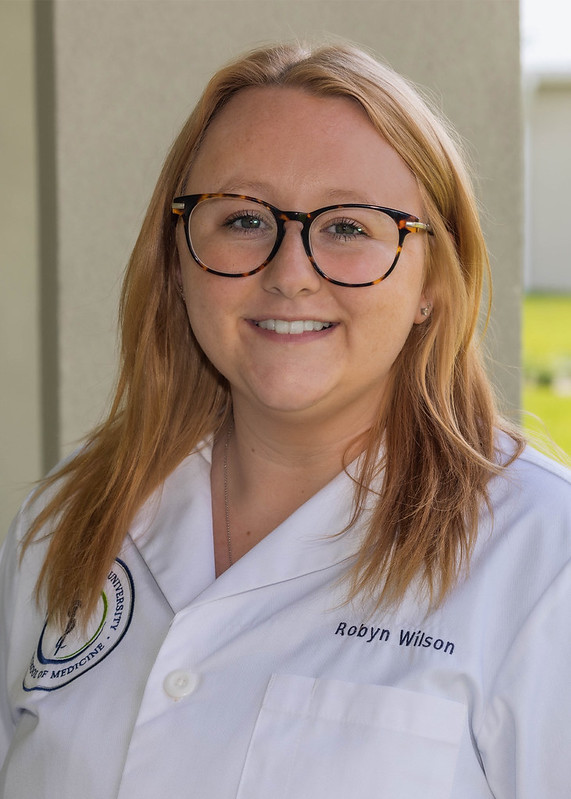
Robyn Wilson, M3, Western Atlantic University School of Medicine
I had two choices: lace up my shoes for a five-mile run or stay wrapped in the warmth of my blanket before a long day on the wards. Every fiber of my tired body said “no, stay in bed” but I remembered the promise I made to myself: I was going to run a marathon during my third year of medical school.
At first glance, the decision seemed irrational. Why add 26.2 miles of training to an already overwhelming schedule of clinical rotations, shelf exams, and personal responsibilities? But what I didn’t know then was that marathon training would become the most valuable form of self-care I could have chosen. It taught me resilience, gave me clarity, and reminded me every single day that I could do hard things.
The third year of medical school is often described as a whirlwind: long hours, steep learning curves, and the emotional rollercoaster of caring for real patients for the first time. I felt pulled in every direction, trying to impress attendings, stay on top of clinical knowledge, and be emotionally available to patients, all while wondering how much of myself I could give before I had nothing left.
Running became my sanctuary.
Each training run offered me a kind of mental clarity I couldn’t find anywhere else. It was the only time of day that was entirely mine, no pagers, no patient lists, no presentations. Just me, my shoes, and the road. Some days I ran to music. Other days, I ran in silence, using the rhythmic pounding of my feet to quiet the mental noise that had built up throughout the week. With every mile, I processed difficult encounters, replayed moments I wished I’d handled differently, and let go of the weight I carried in my white coat.
Physically, training helped me feel strong and capable at a time when I often felt small. Medicine can be humbling, and third year often toes the line between humility and helplessness. It’s hard to feel confident when you’re constantly being evaluated. But when I hit a new personal record on a long run, I felt powerful. That confidence followed me into the hospital as I stood taller during rounds, spoke more assuredly during presentations, and reminded myself that I could do more than I believed.
The biggest lesson running taught me, though, was that success doesn’t require perfection. It requires consistency.
Marathon training isn’t about running fast every day. It’s about showing up rain or shine, energized or exhausted. Some days, I barely finished two miles. Others, I felt invincible. The same is true of medical school. There are rotations where everything clicks, and others where you question your place in this field. But it’s in the showing up, especially when it’s hard, that growth happens.
We talk about mental health in medicine more than we used to, which is progress. Still, it often feels like a checkbox with wellness lectures, burnout surveys, and a reminder to “take care of yourself” in between tasks. But what marathon training showed me is that wellness isn’t a destination. It’s a daily practice.
Some days, wellness meant going for a run. Other days, it meant skipping the run and getting an extra hour of sleep. It meant learning to listen to my body, knowing when to push and when to rest, and honoring my limits without guilt. It meant redefining “balance”, not as a perfect 50/50 between medicine and life, but as a shifting, honest effort to stay aligned with what mattered most.
Of course, there were sacrifices. Training meant saying no to extra shifts or spontaneous nights out. It meant packing protein bars and running shoes for weekend calls. But the return on that investment was priceless. When race day came, I crossed the finish line not just as a marathoner, but as a better, more resilient version of myself.
That finish line represented more than just 26.2 miles. It marked every early morning I pushed through, every patient I cared for, every moment I chose to prioritize myself when it would’ve been easier not to. It reminded me that the strength I built wasn’t in spite of medical school, but rather strength gained by forging through tough times, while I was in medical school.
Now, when the demands of medicine feel too heavy, I return to the mantra that carried me through both training and third year: You can do hard things.
You can run a marathon while navigating clinical rotations. You can care deeply for others without abandoning yourself. You can thrive, not just survive, in a system that too often feels like it demands your entire identity. Most importantly, you can define success for yourself, even when the world around you suggests otherwise.
To anyone reading this who feels like they’re running on empty: find your version of the long run. Maybe it’s writing, painting, prayer, therapy, or simply giving yourself permission to rest. You don’t have to do it all, but you do have to care for yourself. It’s the only way we’ll finish this marathon of a career with our humanity intact.
Robyn Wilson graduated from the University of South Florida and attends Western Atlantic University School of Medicine. Robyn hopes to match in emergency medicine next year.